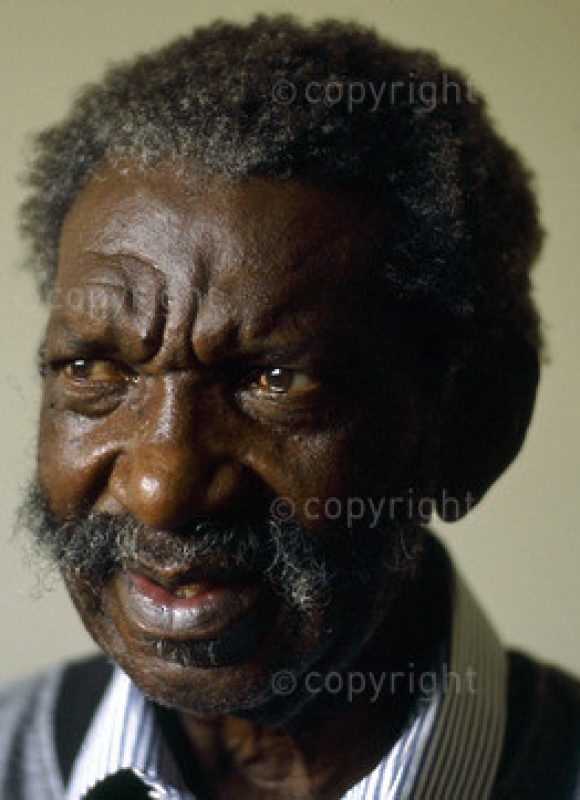PIONEER
Zeph Lekoane Mothopeng

Human Rights Activist | Member of the ANC Youth League | President of the Pan Africanist Congress
Born: 10 September 1913 Died: 23 October 1990
“The role of students in our universities is to proclaim the truth at all times, irrespective of the consequences thereof. They should realise that it is their bounden duty to address themselves to black people and to show them the way to freedom without flinching.”
Who is
Zeph Lekoane Mothopeng?
Founding member and second President of the Pan Africanist Congress (PAC) who was imprisoned on Robben Island repeatedly by the apartheid government, known as “The Lion of Azania”.
Professions
and Roles
Teacher, lawyer, activist, and political prisoner.
Best Known For
His role as an original member of the PAC and his lifelong commitment to Pan-African ideals.
Life highlights
- Mothopeng studied to be a teacher at Adams College in Amanzimtoti, and began work at Orlando Secondary School in 1941. He was involved in various teachers’ associations during his career, as well as political activities from 1943 as a member of the African National Congress Youth League (ANCYL). His opposition to Bantu Education lost him his job as Vice Principal.
- He obtained his BA degree from the University of South Africa (Unisa) in 1946.
- Mothopeng taught in Lesotho before returning to work as an articled clerk in Johannesburg.
- He formed part of the Africanist section of the ANCYL that seceded from the organisation to form the PAC in 1959. He was elected to the PAC’s National Executive and National Working Committee.
- Mothopeng was arrested in 1960 for being one of the organisers of the Anti-Pass Campaign and was jailed for two years. He was once again arrested in 1963 and convicted in 1964 for his involvement with the PAC, which was banned, and sentenced to three years on Robben Island.
- He continued to work for the PAC underground until he was arrested in 1976, where he was held in solitary confinement for 16 months until he was tried and charged in 1978 for promoting the aims of the PAC. He refused to enter a plea because he and his co-accused considered the court illegitimate. The trial lasted 18 months, and in 1979 he was sentenced to 15 years in jail. Despite this, he was elected President by the PAC Central Committee in 1986.
- Mothopeng was released in 1989 by F W de Klerk. He refused to join other liberation organisations in multiracial government negotiations in 1990 and died in the same year.
IN THEIR OWN WORDS
“As the doors of prison lock us in, this time our spirits are very high because we realise that victory is in sight and freedom is on our threshold. We are fully aware that the oppressors are confronted with formidable onslaughts from every angle.”
“We grant no one the right to balkanize our country Azania. We claim the right to manage our affairs in Azania without impairment. It is in this just society which we are striving to establish where justice will be attained and meted out, otherwise justice becomes a sham and mirage as it is unfortunately the case in our country at present.”
– Zeph Mothopeng, letter written just before being imprisoned, 1979
IN THE WORDS OF OTHERS
“I could never fathom it Zeph, wherever you derived the stamina, the grit, to keep going back in there like a boxer who is dazed, throwing himself upon his opponent in the ring for more punishment.”
– Es’kia Mphahlele, writer and activist, 1977
https://www.sahistory.org.za/people/zephania-zeph-lekoane-mothopeng
Mawela, J (25 October 2016), ‘Zeph Mothopeng street naming in Orlando solicits different emotions!’, Soweto Life Magazine,
https://sowetolifemag.co.za/zeph-mothopeng-street-naming-in-orlando-solicits-different-emotions/
Mothopeng, Z (July/August 1975), ‘Reprint of SASO Conference Issue, Newsletter Vol. 5 No. 2’, South African Students’ Organisation,
https://www.sahistory.org.za/sites/default/files/DC/sajul75/sajul75.pdf
Mothopeng, Z (February 1989), Letter written just before being imprisoned ‘Document: ZEPHANIA MOTHOPENG’, Vol. 1, No. 2, Searchlight South Africa,
https://www.sahistory.org.za/sites/default/files/archive-files/zeph_mothopheng.pdf
Wren, C S (24 October 1990), ‘Zephania Mothopeng, 77, Dies; Headed South African Movement’,
The New York Times,
